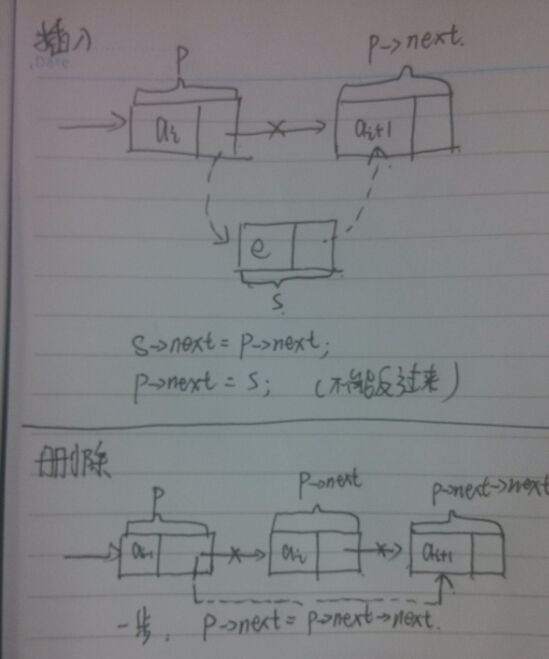Given a linked list, remove the nth node from the end of list and return its head.
For example,
Given linked list: 1->2->3->4->5, and n = 2. After removing the second node from the end, the linked list becomes 1->2->3->5.
Note:
Given n will always be valid.
Try to do this in one pass.
要求是一次过....看来基础还是有点差差的啊。
1.首先回顾一下链表的基本特性,从三点来分析下:
1> 存储分配方式,链表用一组任意的存储单元存放线性表的元素。
2>时间性能,查找O(n),插入和删除,找出某位置指针后,插入和删除时仅为O(1)。
3>空间性能,不需要分配存储空间,只要需要就可以malloc,所以也叫动态链表。
4> 插入和删除节点图示:

2.动态链表的创建(leedcode的链表是没有头结点),第一个形参参数是指针,要想改变指针的值,需要用引用或者指向指针的指针。
void CreateListHead(ListNode* &head, int n) { int j=0; head = (ListNode*)malloc(sizeof(ListNode)); head->next=NULL; head->val=v[j++];//v是用户输入的每个节点的val ListNode* p=head; for (int i=1;i<n;++i) { ListNode* newNode; newNode = (ListNode*)malloc(sizeof(ListNode)); p->next=newNode; newNode->next=NULL; newNode->val=v[j++]; p=p->next; } }
3.所有调试代码
struct ListNode { int val; ListNode *next; ListNode(int x) : val(x), next(NULL) {} }; class Solution { public: int getLength(ListNode *head){ int length=0; while(head){ ++length; head=head->next; } return length; } void deleteNode(ListNode* &head,int loc)//第一个位置是1 { if(loc==1){ head=head->next; } else { ListNode* p=head; int j=1; while (p->next&&j<loc-1) { p=p->next; ++j; } p->next=p->next->next; } } ListNode *removeNthFromEnd(ListNode *head, int n) { if(head==NULL) return NULL; ListNode* res=head;//需要新建局部变量 int len=getLength(res); int loc=len-n+1; deleteNode(res,loc); return res; } }; vector<int> v; int num; void CreateListHead(ListNode* &head, int n) { int j=0; head = (ListNode*)malloc(sizeof(ListNode)); head->next=NULL; head->val=v[j++]; ListNode* p=head; for (int i=1;i<n;++i) { ListNode* newNode; newNode = (ListNode*)malloc(sizeof(ListNode)); p->next=newNode; newNode->next=NULL; newNode->val=v[j++]; p=p->next; } } int main() { freopen("C:\Users\Administrator\Desktop\test.txt","r",stdin); cin>>num; for (int i=0;i<num;++i) { int temp; cin>>temp; v.push_back(temp); } ListNode* head=NULL; CreateListHead(head,num); Solution so; ListNode* res=so.removeNthFromEnd(head,1); return 0; }